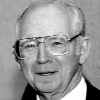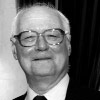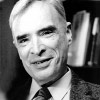|
“Somewhere in that great ocean of truth, the answers to questions about life in the universe are hidden . . . beyond these questions are others that we cannot even ask, questions about the universe as it may be perceived in the future by minds whose thoughts and feelings are as inaccessible to us as our thoughts and feelings are to earthworms. The potentialities of life and intelligence in the universe go far beyond anything that humans can imagine. Theology should begin by recognizing the vastness of the ocean of truth and the pettiness of our search for smoother pebbles.”
— Freeman Dyson
“In an age when we can peer into the mysteries of the genetic code inside us, of the sea beneath us, and the heavens above us, let us try to discover the one formula which still eludes us: how to build two homes next to each other that happiness reigns inside them and peace between them. Thus could my fellow-humans share in my debt for the Templeton Prize as an encouragement not only of progress in religion but of progress through religion.”
— The Rt. Hon. Lord Jakobovits, 1991 Prize Laureate
|
 |
Winners of the Templeton Prize for Progress Toward Research or Discoveries about Spiritual Realities include:
George F.R. Ellis (2004)
“Our cosmology must be able to take account of the magnificent gestures of humanity, and the perceived beauty of the world around. It needs a warmer understanding than is provided by physical cosmology on its own.”
Dr. George Ellis is Professor of Applied Mathematics at the University of Cape Town and has been a visiting lecturer in cosmology, physics and astronomy across the globe, including South Africa, England, Germany, Canada, Italy and the United States. He received his Ph.D. in Applied Maths and Theoretical Physics from St. John’s College at Cambridge, is a fellow of the Royal Society of South Africa, and was President of the International Society of Relativity and Gravitation. Dr. Ellis is coauthor of On the Moral Nature of the Universe: Theology, Cosmology, and Ethics with fellow Foundation Advisor Nancey Murphy, and has collaborated with Stephen Hawking on a number of publications, including The Large Scale Structure of Space Time.
Holmes Rolston III (2003)
 “Facing the new millennium, the four principal, interrelated challenges are: war and peace, population, development, and environment. Science alone doesn’t teach us what we most need to know about any of the four.” “Facing the new millennium, the four principal, interrelated challenges are: war and peace, population, development, and environment. Science alone doesn’t teach us what we most need to know about any of the four.”
Dr. Holmes Rolston taught us that there is such a thing as environmental ethics. He started in 1975 with the publication of “Is There an Ecological Ethic?” in the journal Ethics. It was a new question then, without a clear answer. It is an old question now and the answer has been “yes” for many years, a testimony to the power of the argument he advanced. Nature, Rolston argued, is a sacred gift and must be valued as such. “I've been lucky that my own personal agenda, figuring nature out, has during my lifetime turned out to be the world agenda,” he says, “figuring out the human place on the planet.”
John C. Polkinghorne (2002)
 “I can explain to my scientific friends that I have motivations for my religious beliefs, just like motivations for my scientific beliefs.”
“I can explain to my scientific friends that I have motivations for my religious beliefs, just like motivations for my scientific beliefs.”
Rev. Dr. John C. Polkinghorne taught us that religious belief need not be based on blind faith but rather on solid evidence. Calling himself a “bottom-up” thinker, this mathematical physicist made important contributions to the field of elementary particles before becoming an Anglican priest. He was selected as a Fellow of the Royal Society in 1974 and knighted by Queen Elizabeth II in 1997. Polkinghorne is now the most widely read scholar in the field of science and religion. His Gifford lectures, published as The Faith of a Physicist, shine the light of science on traditional Christianity and find much there to celebrate and affirm.
Ian Barbour (1999)
 “The goal of science is understanding lawful relations among natural phenomena. Religion is a way of life within a larger framework of meaning.”
“The goal of science is understanding lawful relations among natural phenomena. Religion is a way of life within a larger framework of meaning.”
With the 1965 publication of Issues in Science and Religion, Ian Barbour began the long process of eaching the world that the interaction of science and religion was a respectable academic pursuit. Barbour literally created the field of science and religion as we know it today. A physicist who also holds a divinity degree from Yale University, Dr. Barbour is Winifred and Atherton Bean Professor Emeritus of Science, Technology and Society at Carleton College. His work considers theological implications of
scientific events and phenomena.
Paul Davies (1995)
 “In my opinion, science offers a surer path to God than religion.” “In my opinion, science offers a surer path to God than religion.”
Dr. Paul Davies taught us that the physical structure of the cosmos appears to rest on some underlying rational structure. An imaginative scientist, he tackles problems at the leading edge of fundamental physics. His investigations into the mathematical character of the cosmos have convinced him that there is something more to the universe than meets the scientific eye. In 1992, he published a thoughtful exploration of these ideas titled The Mind of God, a major work that initiated a new dialogue between science and religion.
L. Charles Birch (1990)
 “I had to write about history, philosophy and theology as well as science.”
“I had to write about history, philosophy and theology as well as science.”
Dr. L. Charles Birch taught us to reconcile the biological and religious understandings of creation. A population biologist from Australia, Birch is widely recognized as one of the pioneers of modern ecology. After reading philosophical and theological works by Alfred North Whitehead, Charles Hartshorne and Paul Tillich, Birch began to see his scientific work in a larger context.
For more information please visit: www.templetonprize.org
|